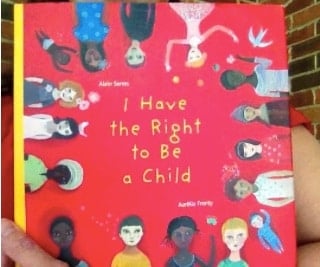
by Cindy Levin | Jun 10, 2014 | 2014, Childhood, Human Rights, Humanitarian, International, Kids, Multicultural, Social Equality, Social Good, United Nations, World Voice

I’ve recently introduced a picture book into my family’s reading time called “I Have the Right to Be a Child” by Alain Serres. With beautiful simplicity, the book provides the author’s interpretation of the United Nations Convention on the Rights of the Child. The Convention includes things like rights to education, gender equality, nutrition, health care, free speech, freedom from child labor, safety, etc. For kids, the book is a conversation starter about human rights. We talked a lot about the question, “What are rights and what are privileges?” For adults, the book is a reminder that these concepts really are not that complicated. It may be complicated in the implementation of granting rights, but when the rights themselves are asserted in the simple language of the children the Convention seeks to protect, it all becomes much more clear.

This is probably the first time my kids saw human rights presented in a way that was meaningful to them. In American museums and text books, the right to vote for women and people of color seems faraway and a “done deal.” They don’t think of those rights as things we continually need to address here and in other countries. My children often help me advocate to give children in developing countries access to school and vaccines, but the language of “rights” isn’t always included in those kinds of discussions.
My youngest really latched on to the page that said,
“I have the right to express myself completely freely, even if it doesn’t always please my dad, and to say exactly how I feel, even if it doesn’t always please my mom.”
We have a lively ongoing debate about how that plays out. If she has the right to express herself completely freely, how might that compete with my perceived right not to be disrespected in my own home or the rights of her other friends and family members?
It might be surprising to Americans to learn that while 194 states in the world have agreed to the Convention, the U.S. has not officially ratified it. In fact, every member of the United Nations except Somalia, the United States, and South Sudan are party to the Convention, having agreed to change or make laws and to develop practices and programs to support it. The U.S. has signed to show support, but hasn’t “ratified” it. Ratification requires being bound by international law and having to report regularly to the UN Committee on the Rights of the Child, which monitors compliance.
Why hasn’t the U.S. ratified? Katie Jay – author of the “Children Deserve Families” blog told me that recognizing that children have a right to a safe and secure permanent family is cutting edge human rights law. The idealistic part of me scoffs at that, saying;
“Really? Cutting edge? To provide security, safety, and nourishment to children is cutting edge?” But the lobbyist part of me knows that it can sometimes be a tricky thing for a country to formally declare something as a “human right.”
Because once you officially do that, then you have to do something about it…or be held accountable by an international authority and possibly give up your moral high ground if you are then seen as a country that doesn’t live up to its own standards. Sadly, from the standpoint of an American citizen who has watched our behavior on international environmental agreements with dismay, I can tell you that Americans generally don’t like the idea of international authority holding us accountable for just about anything.
Has your country ratified the Convention? Take a look at this paraphrased list of rights for children from the book and consider which of them you think are rights or privileges. Are all of them rights? What would be the ramifications for your country to truly grant that right in your country? Internationally? What benefits or problems do you see that could arise if the world embraced the Convention wholeheartedly?
- I have the right to a first name, a last name, a family, and a country that I can call my home.
- I have the right to have enough food to eat and water to drink.
- I have the right to live under a roof, to be warm, but not too hot, not to be poor and to have just enough of what I need, not more.
- I have the right to be cured with the best medicines that were ever invented.
- I have the right to go to school without having to pay.
- I have the same rights whether I am a girl or a boy.
- I have exactly the same right to be respected whether I am black or white, small or big, rich or poor, born here or somewhere else.
- I have the right to be helped by my parents, my friends, and my country if my body doesn’t work as well as other children’s.
- I have the right to be free from any kind of violence, and no one has the right to take advantage of me because I am a child.
- I have the right to go to school and refuse to go to work.
- I have the right to be protected by adults and to be sheltered from disasters
- I have the right never to experience war or weapons.
- I have the right to breathe clean air.
- I have the right to play, to create, to imagine, and also to have friends.
- I have the right to learn about friendship, peace and respect for our planet.
- I have the right to express myself completely freely.
This is an original post written for World Moms Blog by Cindy Levin.
Cynthia Changyit Levin is a mother, advocate, speaker, and author of the upcoming book “From Changing Diapers to Changing the World: Why Moms Make Great Advocates and How to Get Started.” A rare breed of non-partisan activist who works across a variety of issues, she coaches volunteers of all ages to build productive relationships with members of Congress. She advocated side-by-side with her two children from their toddler to teen years and crafted a new approach to advocacy based upon her strengths as a mother. Cynthia’s writing and work have appeared in The New York Times, The Financial Times, the Washington Post, and many other national and regional publications. She received the 2021 Cameron Duncan Media Award from RESULTS Educational Fund for her citizen journalism on poverty issues. When she’s not changing the world, Cynthia is usually curled up reading sci-fi/fantasy novels or comic books in which someone else is saving the world.
More Posts - Website
Follow Me:


by Nicole Melancon (USA) | Jun 3, 2014 | Africa, Babies, Ethiopia, Social Good, World Voice
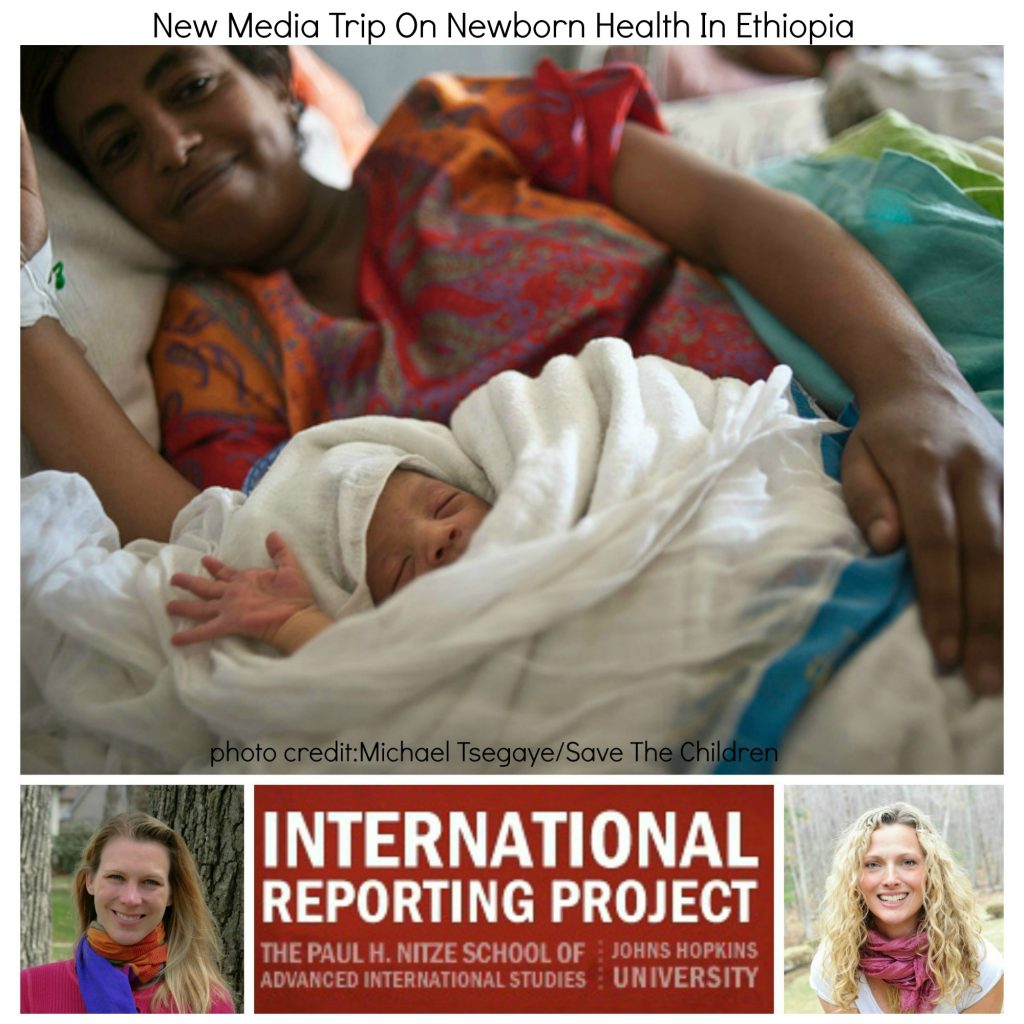
We have exciting news at World Moms Blog! Two World Moms Blog Editors, myself and Elizabeth Atalay, have been selected to travel to Ethiopia this June as New Media journalism fellows with The International Reporting Project (IRP). Last April, World Moms Blog Senior Editor Purnima Ramakrishnan of India was a fellow on the IRP’s Brazil trip where she reported on the reduction of poverty and hunger in Brazil, and how it has embraced the Millennium Development Goals to improve the lives of its citizens.
The International Reporting Project (IRP) is based at The Paul H. Nitze School of Advanced International Studies (SAIS) of the John Hopkins University and the primary goal of the IRP is to provide journalists with the opportunity to report internationally on issues not traditionally covered in mainstream media.
The program was created in 1998, making it a pioneer in the “nonprofit journalism” movement that seeks to fill the gap left by much of the mainstream media’s reduction of international news. The IRP has provided opportunities to more than 400 journalists to report from more than 100 countries and produce award-winning stories.
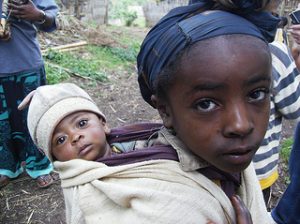
Photo credit: IRP
Elizabeth and I will be two of nine new media journalist fellows heading for a two-week trip to Ethiopia to report on Ethiopia’s efforts to prevent newborn deaths as well as provide an overview of maternal and child health, immunizations, nutrition, communicable diseases, and health care provision, among other topics.
One of the areas that I am most excited to learn about is how Ethiopia, one of the poorest countries in Africa, has stunned the world community by achieving Millennium Development Goal number #4 reducing the mortality rates of children under age 5 by two-thirds well ahead of the 2015 deadline.
In a country in which 95% of the population lives outside of an urban center in rural, remote and hard to reach areas and a shocking 90% of women birth at home without a midwife, Frontline Health Care Workers (FHCW) have been the key ingredient to Ethiopia’s success. I am really excited to meet some of these workers and mothers and share their stories. I am sure it will be a life-changing experience.
While in Ethiopia, I will examine Ethiopia’s political, historical, socio-economic and cultural dynamics to report on this misunderstood country, setting the stage to shed light on the massive effort introduced by the Ethiopian government to achieve MDG4 and what the impact has been on other critical areas such as newborn and maternal health, poverty, and other Millennium Development Goals.
Elizabeth is looking forward to seeing first hand and reporting on maternal and newborn health issues, and solutions in Ethiopia that she has previously only written about. There is great optimism coming out of Ethiopia these days and with the success of decreased maternal and child mortality, the next frontier to conquer is survival of newborns. More than half of the child deaths that do still occur take place in that first year of life, the first 24 hours being most critical. Newborn survival is closely tied to maternal health so issues around safe birth and postpartum care, and addressing uncomfortable issues such as fistula are topics she also hopes to report on.
As one of the most diverse populations in the world with over 83 distinct languages and 200 dialects, Ethiopia shares a unique history, society, culture, environment, economy and governance that is unlike her neighbors. We are honored to have been selected as new media reporting fellows for this trip to Ethiopia, and look forward to sharing our newfound knowledge with you during our upcoming trip.
We would love for you to follow along our journey at #EthiopiaNewborns !
This is an original post written for World Moms Blog by Nicole Melancon of Third Eye Mom.

Third Eye Mom is a stay-at-home mom living in Minneapolis, Minnesota with her two children Max (6) and Sophia (4). Her children keep her continually busy and she is constantly amazed by the imagination, energy and joy of life that they possess! A world wanderer at heart, she has also been fortunate to have visited over 30 countries by either traveling, working, studying or volunteering and she continues to keep on the traveling path.
A graduate of French and International Relations from the University of Wisconsin Madison, where she met her husband Paul, she has always been a Midwest gal living in Minnesota, Wisconsin and Chicago. This adventurous mom loves to be outside doing anything athletic (hiking, running, biking, skiing, snowshoeing or simply enjoying nature), to travel and volunteer abroad, to write, and to spend time with her beloved family and friends.
Her latest venture involves her dream to raise enough money on her own to build and open a brand-new school in rural Nepal, and to teach her children to live compassionately, open-minded lives that understand different cultures and the importance of giving back to those in need. Third Eye Mom believes strongly in the value of making a difference in the world, no matter how small it may be. If there is a will, there is a way, and that anything is possible (as long as you set your heart and mind to it!).
Visit her on her blog, Thirdeyemom, where she writes about her travels and experiences in other lands!
More Posts

by Dee Harlow (Laos) | May 29, 2014 | Awareness, Breastfeeding, Food, Health, Humanitarian, Laos, Maternal Health, Millennium Development Goals, Nutrition, Uncategorized, World Voice, Younger Children
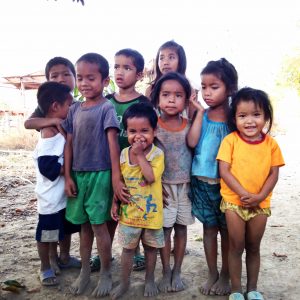 While I still have the opportunity to write another post for the WMB community before leaving Laos later this year, I feel compelled to tell you about child nutrition and the problem of stunting in Laos because stunting is a seemingly invisible problem that can go unnoticed unless special attention is drawn to highlight the issue.
While I still have the opportunity to write another post for the WMB community before leaving Laos later this year, I feel compelled to tell you about child nutrition and the problem of stunting in Laos because stunting is a seemingly invisible problem that can go unnoticed unless special attention is drawn to highlight the issue.
Ethnically, most Southeast Asian people are shorter and have a smaller frames than most other races throughout the world. This fact makes it easy to say that Lao babies and children tend to be small or smaller because of their race.
Yet at first glance Lao children appear to be healthy (and super cute), a closer look and personal interaction will almost always reveal that the children are a few years older than what you had first assumed. I recently met an adorable girl in a northern village at a school where I delivered books by boat since there is no road access to her village. Upon speaking with her (in Lao) I was impressed by how well behaved, articulate and “mature” she was for what I assumed to be a 6-year old. (I have two 4-year old twins so I was instantly optimistic about their potential in just two short years to be as well behaved as this girl.) She turned out to be 10-years old. This has happened time and time again to me, to my colleagues, and to many newcomers to Laos.
Lao children are among the most undernourished in Southeast Asia with 44% stunting of children under 5-years old. It is the single largest contributor to infant and child mortality in the country with 59% of all child deaths related to nutritional deficiencies. Chronic malnutrition predisposes children to higher morbidity and mortality, lower educational attainment, and reduced workforce productivity.
For a country experiencing rapid economic growth and increasing income disparities, fierce external human resource competition puts the country at risk of leaving a majority of the Lao population behind others who will be more able to keep apace. Stunting is a problem that needs be addressed for the immediate wellbeing of Lao children and to be resolved for the future potential of the Lao people.
The Lao government is working closely with experts and development partners on how to tackle this important issue. It is not easy. Poor breast-feeding and weaning practices are widespread. Almost all mothers give food supplements (such as chewed glutinous rice), and pure water, to infants within a few weeks of birth. Harmful practices (such as discarding colostrum) and other food taboos for pregnant women reduce disease resistance for newborns and increase fetal undernutrition. Micronutrient deficiencies, inadequate intake of vitamin A, anemia and iodine deficiency, all further hinder child development.
The current health system is not only faced with challenges of delivering micronutrients, immunizations and necessary vitamins to the most vulnerable population, but they are additionally burdened by the daunting task of changing people’s behaviors to improve dietary habits, increase nutritional intake, and overcoming cultural belief and religious belief obstacles to improved nutrition status among rural and multi-ethnic communities. The task is daunting.
What is being done and what needs to be done?
There are some great organization here making slow but successful strides on a small-scale basis. UNICEF, WFP, IFAD, Save the Children, the Scale Up Nutrition initiative and others who are collaborating closely with government health officials, but resources are scarce, especially in an often overlooked country like Laos.
- We can channel financial support to these organizations for their work on nutrition in Laos.
- We can lobby our governments to increase foreign assistance resources to address the poor state of healthcare in Laos (e.g., Laos is not one of the United States’ ‘priority countries’ receiving Global Health Initiative (GHI) funding. Ask U.S. representatives, Why not?)
- We can voice our concern to private and public interests who are taking advantage of opportunities in Laos to improve their social welfare practices by investing in better healthcare in communities where they pursue their business interests.
- We can ask the question to anyone willing to listen about who should be accountable to improving the welfare of children beginning their lives under such great odds in Laos.
Hopefully someday, someone will listen and take action.
This is an original post to World Moms Blog by our mother of twins writer, Dee Harlow in Vientiane, Laos. You can always find her writing on her blog, Wanderlustress.
Photo credit attributed to the author.
One of Dee’s earliest memories was flying on a trans-Pacific flight from her birthplace in Bangkok, Thailand, to the United States when she was six years old. Ever since then, it has always felt natural for her to criss-cross the globe. So after growing up in the northeast of the US, her life, her work and her curiosity have taken her to over 32 countries. And it was in the 30th country while serving in the Peace Corps in Uzbekistan that she met her husband. Together they embarked on a career in international humanitarian aid working in refugee camps in Darfur, Sudan, and the tsunami torn coast of Aceh, Indonesia.
Dee is now a full-time mother of three-year old twins and continues to criss-cross the globe every two years with her husband who is in the US Foreign Service. They currently live in Vientiane, Laos, and are loving it! You can read about their adventures at Wanderlustress.
More Posts

by Nancy Sumari | May 28, 2014 | 2014, Africa, Awareness, Home, Humanitarian, Nancy Sumari, Social Equality, World Moms Blog, World Motherhood, World Voice

I was recently asked to be a part of the upcoming UNHCR World Refugee Day in my country. I was asked to put literally myself in the shoes of those individuals who have been forced out of their homes and countries, due primarily to conflicts. I was then invited to contribute my thoughts and feelings through a document that would be shared at a gathering on World Refugee Day.
As a mother, I feel that our primal instinct is to protect and nurture, but protection and nurturing that is coupled with nesting. To many of us, a nest may initially bring a picture of “a little bird and a couple of eggs” to mind but in my opinion, a nest brings to mind home. It means having a center, a base, headquarters, in short somewhere to come back to.
That got me thinking. What does this four-letter word, HOME, really mean? To some, not much, because for them it’s something easily taken for granted. To others, it’s a base. A place where you shower, change, nap and get back out there. But, for a lot of people, it’s a residence, it’s family, it’s dignity, it’s freedom. Most importantly, it’s where the heart is. I probably can’t even count the amount of times that I’ve walked in and out of my home, the amount of time I’ve spent time in my home just hiding away from the world in a safe and comforting haven. A lot of those times, I have not really sat and looked around to soak it in and really see what it all means, and certainly not for me, but for my family, until now.
The thought of the loss of this base, this center, a center that helps us be centered, truly breaks my heart. So here I am, thinking about the 5 million people in Tanzania who are currently refugees without ‘A Home’. My heart breaks to think about what that means for the 48% of refugees who are children. I am empathizing with them but also in awe of them all. In awe of their strength. In awe of their resilience.
I wish for a day when every person in this world will have a physical home to house the home each of us carries with us in our hearts.
What does home mean for you?
This is an original post by Nancy Sumari from Tanzania. You can find more of her writing at Mama Zuri.
Photo Credit to Susie Newday.

by Meredith (USA) | May 8, 2014 | 2014, Human Rights, World Voice
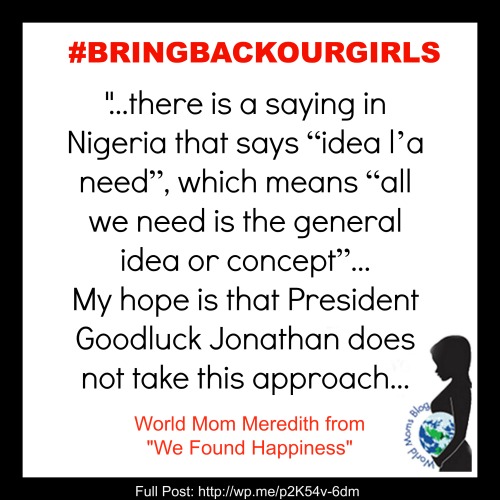
Background on Nigeria
Nigeria is a land of conflict and contrast. Since it’s civil war in the late 1960’s and even earlier, this country is no stranger to acts of violence and tragedy.
According to an article from CNN written by Faith Karimi , “Nigeria is Africa’s most populous nation with 175 million people living within its borders. It is a key partner to the U.S., is rich in oil, and a major trading partner with China.”
According to Wikipedia, “it [Nigeria] has one of the highest economic growth rates in the world at 7.4% over the last decade, but it has retained its high level of poverty at 63% of its people living at or below $1 a day. It’s two main resources are oil and agriculture. However, oil contributes to government revenues and about 15 percent of the Gross National Product and only employs a fraction of the population. Agriculture revenues go to 45 percent of the Gross National Product but employ about 90 percent of the population.
Nigeria’s government provides Nigeria’s states and local governments with autonomy including 50 percent of government revenues as well as responsibility for public services. But, lack of stringent regulator and monitoring systems has allowed for rampant corruption. It has hindered past poverty alleviation efforts and will continue to do so since resources meant for public goods or directed towards investments (and so create employment and other opportunities for citizens) are being misappropriated.”
Add the fact of centuries of tribal rivalry and war and you can understand why Nigeria is where it is today.
Southern Nigeria
The southern part of Nigeria is made up mostly of Yoruba and Igbo peoples (Nigerian tribes). Most Nigerians in this part of the country are Christian and there are a few Muslims, and this part of the country has embraced western ways.
Northern Nigeria
In the North, there are many Hausa people (Nigerian tribe). It is a much heavier Muslim population. For the most part, the Muslim population in the Northern part of Nigeria is peaceful and follows the teaching of Mohammed and his peaceful ways. However, there is a small sect of Islamic Militants who are enforcing Sharia law (Islamic Law) over the majority through terror and violence. Unfortunately, this group is usually what puts Nigeria in the headlines. This group is called Boko Haram and their name means “ Western education is a sin.” in Hausa.
Like so many religious leaders who have called for violence under the cover of religion, that is exactly what this terrorist sect is trying to do. According to an article written by Rosie Collyer for Nigeria Report in November 24, 2011, “people manipulate the system for political and religious reasons,” she adds. “And the average person either doesn’t understand the system or doesn’t have the means [financial], required to navigate it.” (quote from Remi Atunwa, practicing Muslim and barrister in Northern Nigeria).
According to an article written by Faith Karimi for CNN entitiled “ Boko Haram: A Bloody Insurgency, A Growing Challenge”, “Boko Haram was founded 12 years ago by Muhummad Yusuf. He was killed in 2009 by the military forces. After the killing of its leader, Boko Haram became even more defiant and a new leader for the organization came to power named Abubukar Shekeu.”
As stated before, anyone can manipulate something for different reasons and that is what is happening with Boko Haram and it’s interpretation of Sharia Law. Right now, 9 states in the north are under full Sharia law and 3 states have some form of Sharia law in the Muslim population.
Some may ask, how can the people in northern Nigeria agree to these practices? Most people in the north do not support Boko Haram but there is some sympathy for Sharia law according to Faith Karimi in her article for CNN. She reports that “there is much sympathy because many Muslims in the north see it as the only way to end an inept, corrupt government.”
She goes on to report,” Poverty is prevalent in the North region. The military is trying to halt Boko Harams’s attacks but the group is winning the most important battle: Making Nigerians question government competency.” She continues to report that Boko Haram has been responsible for several attacks in Nigeria ; the most recent ones being in 2011 with a suicide bombing in Abuja (Nigeria’s capital) outside the United Nations building which killed 25 people. In November, several Christian women (pregnant and others with small children) were kidnapped and later returned. And most recently a few weeks ago, Boko Haram was responsible for blowing up a bus station in Abuja and killing 71 people.
#BRINGBACKOURGIRLS
As a result of Sharia law, this militant group believes that girls should not be educated and should be married off which led to the capture and abduction of over 200 girls from a government school in Chibok, a city in the north of Nigeria.
The fact that these girls were attending school at all meant that each day they were putting their lives in danger for something that we, in the west, take for granted. With each passing day, the likelihood of the girls returning gets smaller and smaller.
Some parents of the kidnapped girls are afraid to talk to the police for fear that their daughters will be harmed by the militant group. The fact that they are too afraid to talk to the police only strengthens what is already widely known to many Nigerians: they cannot trust the government to do their jobs. But, in turn, without cooperation from the parents to supply any kind of vital information, it becomes less likely for the police to do their job at all. And so, the cycle of ineptitude continues…
In a book I recently read entitled “Every Day is For the Thief” by Teju Cole, a Nigerian author, he says there is a saying in Nigeria that says “idea l’a need” which means “all we need is the general idea or concept.” I saw this many times myself while living in Lagos. When Lagos state instituted a law saying that all okada (motorcycle) drivers and their passengers had to wear helmets, the drivers wore mopping buckets on their heads and the passengers riding the okadas simply held a helmet, bowl or bucket over their heads (who had just had their hair done simply held a bucket over their head without it even touching their heads) because it was the idea that they had a helmet…it didn’t actually have to function. There are so many things like that which I observed happen while I lived in Nigeria.
My hope is that President Goodluck Jonathan does not take the approach of “idea l’a need”.
I hope he doesn’t think just by doing his one press conference on Sunday that he somehow fulfilled the concept of what a president should do to help his people and will actually be a functioning president to do something to get these girls back to their homes. The whole world is his stage right now, and we are all watching this performance unfold. It is time for the government of Nigeria to show the world it can function and that it cares for its people and their desperate needs. It needs to function to protect its children.
These kidnappings are a cry to the world that the people in Nigeria are desperate, and if the Nigerian government ignores the poverty and ineptness in its government too long, the people of that country will only see what they already know in their hearts. They will witness a government that is there in concept only and not really there to take care of its people.
For more information on what you can do to help, see our previous post, Standing in Solidarity to #BRINGBACKOURGIRLS.
What are your thoughts on what is happening in Nigeria? Anything you’d like to add to this post?
This is an original post by Meredith. You can check out Meredith’s life as an expat in Nigeria and her transition back to life in the U.S. on her blog at www.wefoundhappiness.blogspot.com/
Photo credit to Flickr creative commons and www.freestock.ca
Articles used in the writing of this article include:
Wikipedia
“Boko Karam:A Bloody Insurgency, A Growing Challenge” by Faith Karimi CNN April 22, 2014
“Sharia favours the Rich, Claim Nigerian Rights Activists” Nigeria Report November 24, 2011 by Rosie Collyer
“Every Day is for the Thief” by Teju Cole (novel)
Meredith finds it difficult to tell anyone where she is from exactly! She grew up in several states, but mainly Illinois. She has a Bachelor of Science degree in Elementary Education from the University of Illinois at Champaign/Urbana which is also where she met her husband. She taught kindergarten for seven years before she adopted her son from Guatemala and then gave birth to her daughter two years leter. She moved to Lagos, Nigeria with her husband and two children in July 2009 for her husband's work. She and her family moved back to the U.S.this summer(August 2012) and are adjusting to life back in the U.S. You can read more about her life in Lagos and her adjustment to being back on her blog: We Found Happiness.
More Posts

by Jennifer Prestholdt (USA) | May 6, 2014 | 2014, Human Rights, World Voice

It’s the kind of thing that keeps you awake at night.
Even if it is not your own child.
On the night of April 14, dozens of armed men showed up at the dormitory of the Government Girls Secondary school in Chibok in northeastern Nigeria. Dressed in Nigerian military uniforms, they told the girls that they were there to take them to safety and herded the girls into trucks and onto motorcycles. At first, the girls believed them. But when the men started shooting their guns into the air and shouting, “Allahu Akbar,” they realized that the men were militants from Boko Haram and that they were in serious danger.
Nearly 50 girls managed to escape by running away or jumping out of the trucks. But as many as 276 school girls (higher than the initial reports of 234) between the ages of 12 and 17 were kidnapped, disappearing into the night without a trace. Three weeks later, their parents still have no idea where they are. And last week reports began surfacing that the abducted girls were taken across the borders to Chad and Cameroon and sold as brides to Islamist militants for 2,000 naira (about $12). While we still don’t know where the girls are or what has happened to them, these reports remain a chilling reminder of the threat of sexual violence faced by women and girls in conflict zones.
One of the worst things in this truly horrible story is that the girls who were abducted were targeted simply because they were exercising their right to go to school. Throughout the world, there is clear evidence that education is the key to reducing poverty for women and girls.
Access to basic education for girls has remained low in Nigeria; the northern region where these girls lived has the lowest girl child enrollment —in 2008 the net enrollment rate for girls into secondary school was only 22 percent. The girls (who were both Christian and Muslim) at the Government Girls Secondary School in Chibok must each have been determined to get an education in spite of tremendous odds. The fact that these girls were also risking violence to be in school illustrates how important the right to education was to each of them.
For more than two weeks, the Nigerian government failed to take effective action to find and rescue the abducted girls. The lack of government response has provoked outrage in Nigeria. Last week, several hundred participated in a “million-woman protest march” in Abuja, Nigeria’s capital to demand that more resources be put toward finding and securing the kidnapped girls. The protesters in Nigeria are joined on Twitter with a growing movement under the hashtags #BringBackOurGirls, #BringBackOurDaughters and #234Girls. Finally, international media outlets are paying attention to the story.
While it is ludicrous that it took more than two weeks of pressure from both inside and outside Nigeria to finally bring about action, there are signs that the increased international attention is having some effect.
This week, President Goodluck Jonathan met “through the night” with security, school and state officials and issued a new directive that “everything must be done” to bring back the abducted girls.
We at World Moms Blog stand in solidarity with the girls and their families. It’s time to #BringBackOurGirls!
Here’s what you can do:
1. Sign the Petition
http://www.change.org/petitions/over-200-girls-are-missing-in-nigeria-so-why-doesn-t-anybody-care-234girls
2. #BRINGBACKOURGIRLS
Use social media to spread the word about the situation in Nigeria. Put massive pressure on the government, security forces, and the neighboring governments to spur them to action. Use the hash tag, #BRINGBACKOURGIRLS. Change your profiled picture to Bring Back Our Girls.
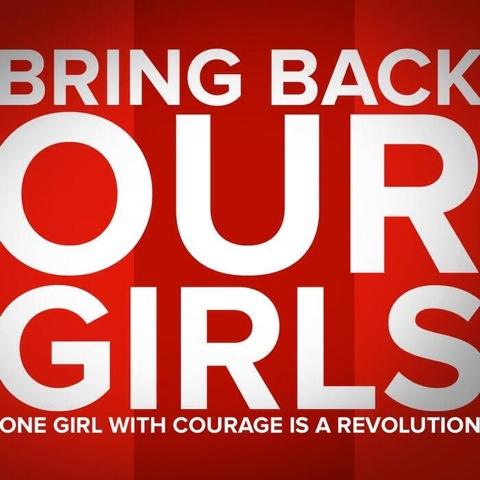
3. Get More Information
Read more by World Moms Blog contributor Jennifer Prestholdt in The Advocates for Human Rights post, “Nightmare for Nigeria’s School Girls,” at:
http://theadvocatespost.org/2014/04/30/nightmare-for-nigerias-school-girls/
This is an original post to World Moms Blog by international human rights lawyer, Jennifer Prestholdt, of Minnesota, USA.

Jennifer Prestholdt is a lawyer and the Deputy Director of The Advocates for Human Rights, a volunteer-based human rights organization that works locally, nationally and internationally. Her work in human rights takes her around the world, but she spends most of her time in Minneapolis, MN, where she lives with her children (two sons and one daughter), her husband, an elderly cat and a dwarf hamster.
As Jennifer’s kids are now all in school (1st, 4th and 6th grades), she is finally finding more time to do the things that she used to love to do, especially running, writing and knitting. Jennifer loves to travel and has had the dubious distinction of having been accidentally locked in a bathroom on five continents so far. Australia and Antarctica await!
In January 2011, Jennifer made a New Year’s Resolution to start writing about her experiences in order to share with her children the lessons learned from 15 years of work in human rights. The result is her personal blog, The Human Rights Warrior. The name comes from her son Simon, who was extremely disappointed to learn that his mother is a lawyer, not a warrior.
You can find her on her blog The Human Rights Warrior or on Twitter @Jprestholdt.
More Posts


















